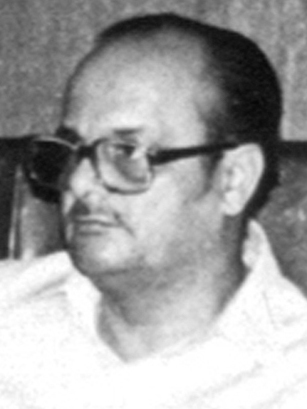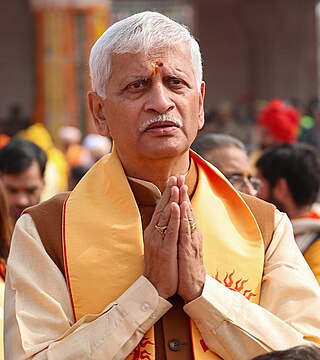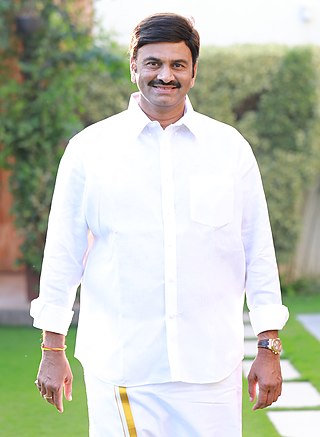Related Research Articles

The National Human Rights Commission of India is a statutory body constituted on 12 October 1993 under the Protection of Human Rights Ordinance of 28 September 1993. It was given a statutory basis by the Protection of Human Rights Act, 1993 (PHRA). The NHRC is responsible for the protection and promotion of human rights, defined by the act as "Rights Relating To Life, liberty, equality and dignity of the individual guaranteed by the constitution or embodied in the international covenants and enforceable by courts in India".

Arjun Singh was an Indian politician from the Indian National Congress, who served twice as the Chief Minister of Madhya Pradesh in the 1980s. He also served twice as the Union Minister of Human Resource Development, in the Manmohan Singh and P. V. Narasimha Rao ministries.
The Other Backward Class (OBC) is a collective term used by the Government of India to classify castes that are educationally or socially backward. It is one of several official classifications of the population of India, along with general castes, Scheduled Castes and Scheduled Tribes (SCs and STs). The OBCs were found to comprise 52% of the country's population by the Mandal Commission report of 1980 and were determined to be 41% in 2006 when the National Sample Survey Organisation took place. There is substantial debate over the exact number of OBCs in India; it is generally estimated to be sizable, but many believe that it is higher than the figures quoted by either the Mandal Commission or the National Sample Survey.

The High Court of Karnataka is the High Court of the Indian state of Karnataka and thus its highest judicial authority. The court's principal bench is located in Bengaluru, the capital city of Karnataka, with additional benches in Hubballi-Dharwada and Kalaburagi. It was previously called the High Court of Mysore. In Bengaluru, the High Court functions out of a red-painted brick building known as the Attara Kacheri, located opposite the Vidhana Soudha, the seat of the Karnataka Legislature.

Byrraju Ramalinga Raju is an Indian businessman. He is the founder of Satyam Computer Services and served as its chairman and CEO from 1987 until 2009. Raju stepped down following his admission to embezzlement from the company to the tune of ₹7,136 crores, including ₹5040 crores of non-existent cash and bank balances. In 2015, he was convicted of corporate fraud, which led to the collapse of Satyam Computers.

The Sriram Sagar Project is also known as the Pochampadu Project is an Indian flood-flow project on the Godavari. The Project is located in Nizamabad district, 3 km away from National Highway 44. It has been described by The Hindu as a "lifeline for a large part of Telangana".
Reservation is a system of affirmative action in India created during the British rule. It provides historically disadvantaged groups representation in education, employment, government schemes, scholarships and politics. Based on provisions in the Indian Constitution, it allows the Union Government and the States and Territories of India to set reserved quotas or seats, at particular percentage in Education Admissions, Employments, Political Bodies, Promotions, etc., for "socially and educationally backward citizens."
The Indian Institutes of Technology (IITs) practices affirmative action and offers reservation to the "backward and weaker sections" of the society that includes SC/ST/OBC-NCL/EWS/PWD/Girl candidates.
Creamy layer is a term used in Indian politics to refer to some members of a backward class who are highly advanced socially as well as economically and educationally. They constitute the forward section of that particular backward class – as forward as any other forward class member. They are not eligible for government-sponsored educational and professional benefit programs. The term was introduced by the Sattanathan Commission in 1971, which directed that the "creamy layer" should be excluded from the reservations (quotas) of civil posts. It was also identified later by Justice Ram Nandan Committee in 1993.

The Uphaar Cinema fire was one of the worst fire tragedies in recent Indian history. The fire started on Friday, 13 June 1997 at Uphaar Cinema in Green Park, Delhi during the three o'clock screening of the movie Border. Fifty-nine people were trapped inside and died of asphyxiation (suffocation), while 103 were seriously injured in the resulting stampede.

The Human Rights Law Network (HRLN) is an Indian non-profit organisation founded in 1989 to protect the fundamental human rights and civil liberties of the most marginalised and vulnerable members of society. Working on the intersection of law, advocacy, policy, and education, HRLN is organised as a collective of lawyers and social activists dedicated to providing legal assistance to vulnerable and disadvantaged individuals, advocating for the implementation of structures to safeguard human rights and fight systemic oppression, and educating the public on their rights and remedies. HRLN provides pro bono legal services to marginalised groups, conducts investigations into human rights violations, and undertakes high-stakes impact litigation in service of the public interest. The organisation operates across the spectrum of public interest law, focusing specifically on children’s rights, rights of disabled persons, rights of people living with HIV/AIDS, prisoners' rights, refugee rights, rights of indigenous people, workers' rights, rights of minorities, and the protection of victims of sexual violence or trafficking.

Krishna Godavari Basin is a peri-cratonic passive margin basin in India. It is spread across more than 50,000 square kilometres in the Krishna River and Godavari River basins in Andhra Pradesh. The site is known for the D-6 block where Reliance Industries discovered the biggest natural gas reserves in India in 2003.

Colin Gonsalves is a designated Senior Advocate of the Supreme Court of India and the founder of Human Rights Law Network (HRLN). He specializes in human rights protection, labour law and public interest law. He has been awarded Right Livelihood Award for the year 2017 for "his tireless and innovative use of public interest litigation over three decades to secure fundamental human rights for India’s most marginalised and vulnerable citizens." Considered a pioneer in the field of public interest litigation in India, he has brought several cases dealing with economic, social and cultural rights. Most of these cases, decided by the Supreme Court, have been set as precedents.

Nambi Narayanan is an Indian aerospace scientist who worked for the Indian Space Research Organisation (ISRO). As a senior official at the ISRO, he was briefly in charge of the cryogenics division. He was awarded the Padma Bhushan, India's third-highest civilian award, in March 2019.

The Polavaram Project is an under construction multi-purpose irrigation project on the Godavari River in the Eluru District and East Godavari District in Andhra Pradesh. The project has been accorded National project status by the Central Government of India. Its reservoir back water spreads up to the Dummugudem Anicut and approx 115 km on Sabari River side. Thus back water spreads into parts of Chhattisgarh and Odisha States. It gives major boost to tourism sector in Godavari Districts as the reservoir covers the famous Papikonda National Park, Polavaram hydro electric project (HEP) and National Waterway 4 are under construction on left side of the river. It is located 40 km to the upstream of Sir Arthur Cotton Barrage in Rajamahendravaram City and 25 km from Rajahmundry Airport.

Nuthalapati Venkata Ramana is a former Indian judge and journalist who served as the 48th Chief Justice of India.

Uday Umesh Lalit is an Indian lawyer and former Supreme Court Judge, who served as the 49th Chief Justice of India. Previously, he has served as a judge of Supreme Court of India. Prior to his elevation as a judge, he practised as a senior counsel at the Supreme Court. Justice Lalit is one of the six senior counsels who have been directly elevated to the Supreme Court. He is currently ‘Distinguished Visiting Professor’ at Ashank Desai Centre for Policy Studies, Indian Institute of Technology, Bombay and Distinguished Visiting Professor at West Bengal National University of Juridical Sciences.
John Michael D'Cunha is an Indian Judge elevated as a Permanent Judge in the Karnataka High Court on 1 November 2018.

Kanumuru Raghu Rama Krishna Raju is an Indian industrialist and politician who served as a Member of Parliament (MP) in the 17th Lok Sabha representing Narasapuram constituency, Andhra Pradesh. He belongs to Telugu Desam Party.
References
- ↑ "Uphaar fire tragedy: SC reduces compensation to kin of victims". The Times of India. 13 October 2011.
- ↑ "Who is Justice RV Raveendran, retired Supreme Court judge assigned to head Pegasus probe?". 28 October 2021.
- ↑ "Raju Varadarajulu Raveendran -- Profile". Supreme Court of India . Retrieved 23 February 2010.
- ↑ "Confusion prevails over SC's OBC quota verdict". Rediff. 11 April 2008. Retrieved 23 February 2010.
- ↑ "SC stays death sentence of 2 Mumbai blasts convicts". Rediff. 7 April 2008. Retrieved 23 February 2010.
- ↑ "Justice Reddy to hear RIL, RNRL case". Rediff. 4 November 2009. Retrieved 23 February 2010.